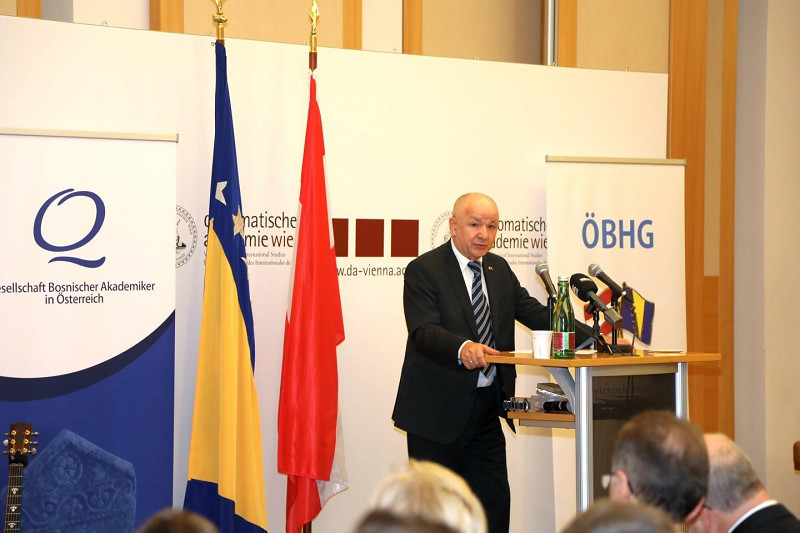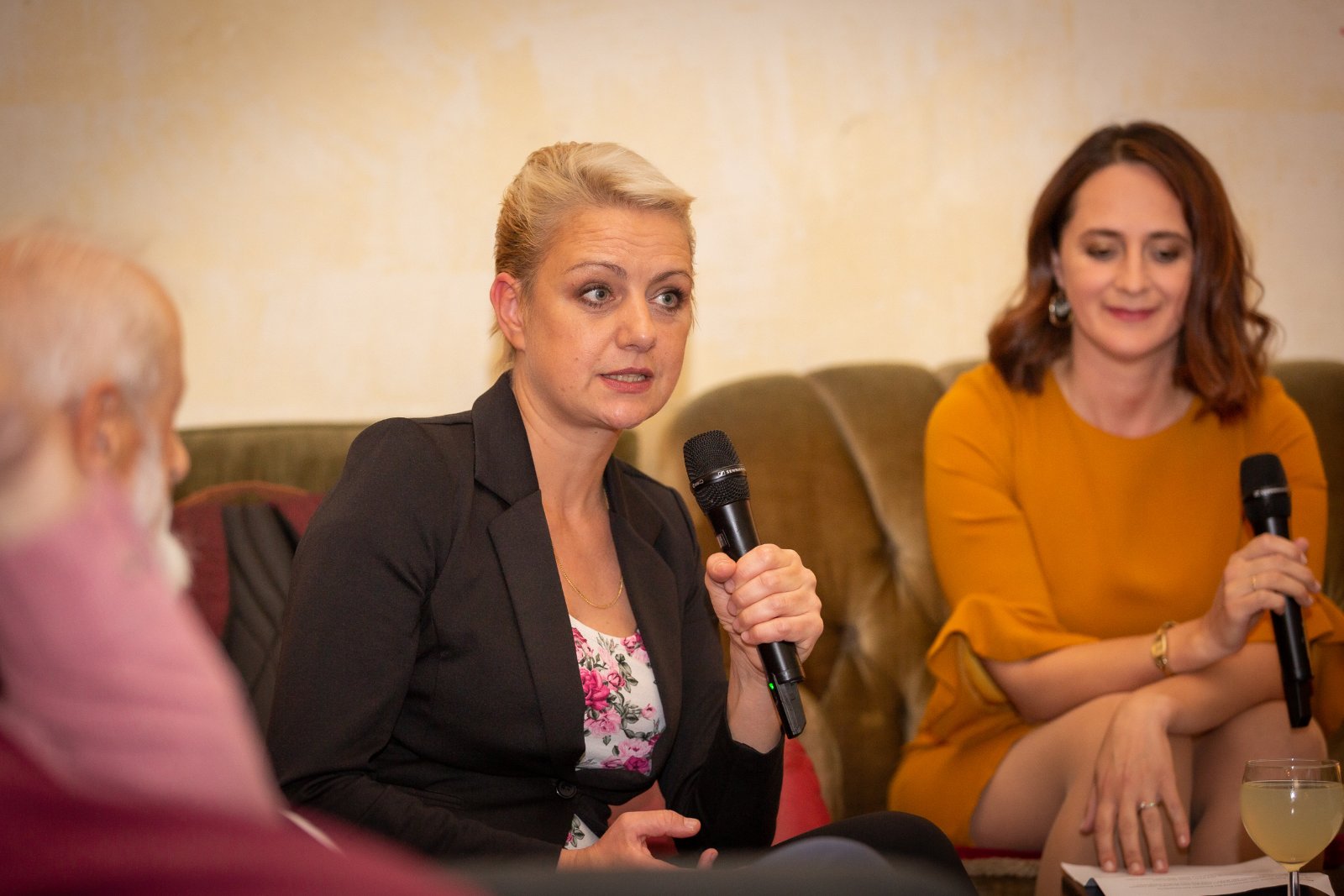In Bosnia, ethnic identity – Serb, Croat or Bosniak – comes first. Can it be different among Bosnians elsewhere?
By Harun Dinarevic
Siradj Duhan can trace his decision to flee Yugoslavia to two threatening conversations, one in 1989 and another in 1990.
The first followed an arms industry conference in the then Yugoslav republic of Serbia, when Duhan, who worked as an engineer in an arms factory in Yugoslav Bosnia and Herzegovina, spoke out against then Serbian nationalist leader Slobodan Milosevic.
A Serbian military officer called and told him to “Get in the car and don’t stop anywhere in Serbia,” Duhan, now 58, recalled.
The second call came after Duhan began agitating for the director of the factory where he worked to be dismissed. The director was from Serbia, appointed by Belgrade. Retribution came fast, costing Duhan his postgraduate degree and, effectively, his home.
“A state security officer called me and accused me of undermining the system. He gave me a certain number of days to leave the country. So I failed to defend my master’s thesis. I still have it to this day.”
Duhan and his wife fled for Austria, from where they watched Yugoslavia implode in war. Bosnia was torn apart. Some 100,000 people died and many more fled.
The independent Bosnia they left behind remains divided, a state of three ‘constitutive peoples’ – the three once warring parties – Bosniaks, Serbs and Croats, overriding any sense of civic identity as ‘Bosnian’. Only a tiny percentage identify as ‘Bosnian’ by nationality.
As co-founder of the Bosnian Academic Society in Austria, Duhan has been pressing to change this, in Austria at least, by seeking recognition of Bosnians as a national minority, securing a place in Austrian society against the sometimes hostile political currents sweeping Europe.
“For us, recognition would mean that the constitution and the state are behind us and that no current can come to easily sweep us away,” said Duhan, now an Austrian citizen who went on to work for Schindler designing escalators.
“There are always cold winds blowing from the left and right, but when you are protected by the constitution then you have a strong anchor and the opportunity to defend yourself.”
Kasim Trnka, a professor of constitutional law professor, said the issue highlighted a fundamental difference in postwar Bosnia.
“Persons from here [Bosnia], who are divided by nationalistic rhetoric when they live here, once they move to a different legal system in a democratic country they are faced with the fact that the citizen comes first and that a civic identity is vital,” Trnka told BIRN.
“These people then come to understand that as citizens they are free to enjoy, in this capacity, all the rights any national minority might have. In short, people behave as the system allows them to behave.”
‘Security’ in special status
During the collapse of Yugoslavia, Austria received the second highest number of refugees from Bosnia, though the Bosnian presence in the country can be traced much further back.
In the late 19th century, when Bosnia was part of the Austro-Hungarian Empire, some wealthy Bosnian families began sending their children to school in Vienna, rather than Istanbul. But the first significant wave of migration came in the 1960s and 70s, when large numbers of low-skilled workers from socialist Yugoslavia left for Germany and Austria,
finding work in the booming construction sector following the devastation of World War Two.
A second wave followed with the collapse of Yugoslavia. By then, Duhan was working in engineering in Vienna, and in 1993, with the flow of refugees from Bosnia unabated, he founded the Bosnian Academic Society with the writers Dževad Karahasan and Alija Isaković.
The following year, the society recorded its first success with recognition in Austria of the Bosnian language, meaning children of Bosnian migrants can study Bosnian in schools.
Duhan, however, had a bigger goal – recognition of Bosnians as a national minority.
National identity can be a slippery concept, not least for Bosnia, where ethnic belonging took precedence with the onset of war. In the country’s last census, in 2013, the vast majority deferred to their ethnic belonging when stating their nationality – Serb, Bosniak or Croat. Just 2.7 per cent were listed as ‘Others’, a catch-all term for everyone from Jews to Roma, Bosnian to Yugoslav.
Pianist Tina Kordić, who left besieged Sarajevo in 1994 to study in Vienna, said nationality had always been “foreign” to her.
But on joining the Bosnian Academic Society in 2019, Kordić said she saw its initiative for recognition as a chance to overcome ethno-national divisions which, while not so pronounced in Austria as in Bosnia, were still present.
“To be recognised as a national minority means, above all, to receive a kind of award, confirmation for your outstanding contribution to the cultural, historical and political life of the country of Austria,” Kordić told BIRN. “And people of Bosnian origin in Austria should have security, not to be exposed to any kind of stigmatisation.”
Today, some 170,000 people born in Bosnia live in Austria. The last wave of migration has coincided with the flow of mainly Muslim refugees and migrants from the Middle East, Asia and Africa over the past five years, seized on by the far-right to make political inroads on the back of anti-immigrant sentiment across Europe.
Billboards in Vienna feature the 38-year-old leader of the right-wing Freedom Party, Dominik Nepp, and anti-immigrant, anti-Islam slogans. This has unsettled the many Muslims among the Bosnian population of Austria.
“Already in Vienna about five per cent of Austrians are of Bosnian origin, and about two per cent in the whole of Austria,” said Kordić.
“It is an integrated group and not stigmatised, but given the diversity that the Bosnians have, in terms of religion – Orthodox, Catholics and Muslims – they are a group in which individual religions may be stigmatised, as we see Muslims are currently stigmatised.”
‘In the spirit of the old country’

Unlike in Bosnia, Austria does not differentiate between those who came from Bosnia – they are all ‘Bosnians’.
“Everyone who came here with a BiH [Bosnia and Herzegovina] passport is a Bosnian,” said Kordić. “If he received Austrian citizenship, his origin is where he was born. It’s not what he declares himself to be, but where he came from.”
Some in the Bosnian community, however, do differentiate.
According to the 2018 study ‘Mapping the Diaspora from BiH’, “BiH diaspora associations in Austria are largely segregated and decentralised, established on a national and ethnic basis, although there are some associations registered as multiethnic” – such as Duhan’s Bosnian Academic Society.
That said, the study noted that a “good percentage” of the Bosnia diaspora chose to identify as ‘Other’, “suggesting reluctance on the part of some diaspora members to identify themselves with one of the three major ethnic groups.”
“In fact,” the authors wrote, “many BiH diaspora individuals prefer to identify as simply ‘Bosnian’ and some even as ‘former Yugoslav,’ in the spirit of the old country.”
In Bosnia, on the other hand, there is an “exclusivity,” said Bosnian analyst and psychologist Srdjan Puhalo – “they do not allow us to be Serbs as well as Bosnians, Croats as well as Bosnians and Bosniaks as well as Bosnians.”
“This is a problem with the constitution on one side, but also for each individual and their own interpretation,” Puhalo told BIRN. “Here it is vital to be a Serb, Bosniak and Croat first, and then everything else, which tells you all you need to know about how over-defined those identities are, so everything else is less important.”
Law stands in way of recognition

Whether he has the support or not, Duhan faces an uphill battle to win recognition of Bosnians as a national minority.
Austrian law distinguishes between indigenous minority groups, or volksgruppe, and immigrant minority groups. Only indigenous communities can be official recognised as national minorities, bestowing upon them special status.
In Austria, these include Carinthian Slovenes, Burgenland Croats, Hungarians, Czechs, Slovaks, Roma and Sinti. The Roma and Sinti were the last to receive special status, in 1993.
More recently, the Green Party, which is now in government with Chancellor Sebastian Kurz’s conservative Austrian People’s Party, tried but failed to win recognition for the traditionally nomadic Yenish community, an indigenous Germanic people.
Austria’s Green Party justice minister, Alma Zadic, also is originally from Bosnia, fleeing as a child during the war.
In January this year, Zadić said there had been more than 25,000 cases of online hate speech against her, exclusively because of her origin. Zadić could not be reached for an interview for this story.
Gabriele Novak-Karall from the Croatian Centre in Vienna, the umbrella organisation of Burgenland Croats in Austria, said Bosnians would have difficulty winning special status.
The Burgenland Croats trace their roots in the territory of today’s Austria to the 16th century, during the Ottoman conquest of the Balkans.
Austria did not simply grant the Burgenland Croats special status. “The Croats fought for it,” she said.
There are indications too that Austrian society fears opening the flood gates if one ‘non-indigenous’ minority is recognised, leading to similar requests from Serbians, Turks, Romanians and others who have made their homes in Austria.
Duhan says that, at the start of his quest, he asked a government official how Bosnians could secure the status of national minority. According to Duhan, the official told him to come back in 20 years.
More than 20 years later, Duhan is still trying, the number of Bosnians in Austria swelled again by a new wave of migration by better-educated Bosnians leaving their country not because of war or poverty but out of dissilluionment that anything will change for the better.
In its favour, the Bosnian Academic Society likes to cite the fact that the crime rate among Bosnians in Austria is relatively low, the level of education is relatively high and there are historical ties between Bosnia and the Austro-Hungarian Empire. Austria’s ministry for women and integration, however, stressed to BIRN that Austria recognises only indigenous minorities.
Tide might turn

Ružica Čubela, a member of the Society, said the political climate can change quickly and potentially in their favour.
While Kurz’s party is unlikely to yield, she said, “I am still optimistic. I think that every current comes to an end at some point and that recognition can happen very easily.”
“But it is up to us to prepare it and work on it, and when that opportunity arises, to grab it.”
In August this year, a text on the website of the Austrian daily Heute addressed the issue, noting that “several reasons, including historical and socio-political, speak in favour of recognition.”
“The Bosnian community is one of the five largest in Austria, Austrians with Bosnian roots are well integrated and make an important contribution to the development of Austria,” it said.
In the meantime, the Bosnian Academic Society has launched an online survey to gauge the mood within the Bosnian community towards the initiative.
The survey will run to the end of the year, when the Society will decide how to proceed.
“When we gather a certain number of people who will give us support, with that number we will go to submit an official request,” said Duhan.
“So far there are preliminary talks and a letter of intent, but this survey will be the background behind the request. I hope that this will happen at the end of next year.”
Harun Dinarevic was born in Sarajevo in 1989. He graduated from the Faculty of Philosophy in Sarajevo, where he studied comparative literature and Bosnian literature. He writes short stories, essays, film and literary critiques for literary magazines and other media outlets. Last year, he focused on reporting on the Bosnian diaspora in Europe for the media outlet Oslobodjenje, as well as a number of other topics for the magazine Dani. He now works as a freelancer.

This article has been produced as part of the Resonant Voices Initiative in the EU, funded by the European Union’s Internal Security Fund – Police.
The content of this story represents the views of the author and is the sole responsibility of BIRN. The European Commission does not accept any responsibility for use that may be made of the information it contains.
